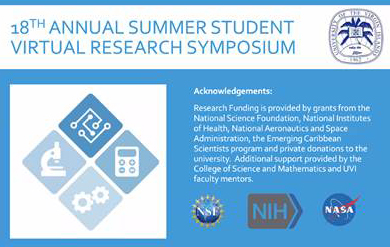
The University of the Virgin Islands (UVI) held its 18th annual Summer Research Symposium via Zoom on Friday, July 31. The event brought together more than 40 undergraduate students, who presented their summer research on a variety of scientific disciplines, which included marine biology, environmental science, biomedicine and community health, STEMEducation and Social Science, COVID-19 and chemistry, and astrophysics and technology.
The virtual research symposium featured 53 student presenters with 10 moderators who participated in six concurrent sessions. The research topics were selected by mentors in collaboration with the students’ interests, or in some instances, the students indicated the kind of research they were interested in and were then paired with a mentor.
“Initially, we were very concerned about how to provide students with the same quality experience in a post- COVID academic and research environment,” said Dr. Verleen McSween, assistant professor of biology. “However, our students were adaptable, innovative, and willing to learn new technologies and apply them in order to conduct their research and meet the challenge of engaging with science and the community in a virtual format.”
“The virtual symposium was immensely successful as evidenced by the quality presentations produced by our research mentees and their supportive UVI and mainland research mentors,” Dr. McSween stated.
Dazonte Mathurin-Phaire’s research was focused on “Kale Leaf Growth and Water Content.” According to Mathurin-Phaire’s abstract, “Kale is a health food grown during the cool season in temperate climates; however, the U.S. Virgin Islands (U.S.V.I) lacks a cool season, hence the need to evaluate how kale grows.” The objective of his research was to “help farmers decide what kale to plant and when to harvest the leaves by studying the rate of leaf growth and water content in fifteen kale varieties.” “The Summer Research Symposium was a great meeting place for scientist and future scientist to share our discoveries,” said Mathurin-Phaire, a UVI sophomore majoring in biology.
“The symposium was a great experience. It helped me realize what areas I needed to improve on while giving a presentation,” said Joshua Parris. “The best part about the symposium was hearing about what the other students worked on for their summer research project. I learned more than I anticipated to learn during this symposium. It was truly a great experience,” he said. Parris’ research was based on “Detecting Transient Sources.” According to Parris’ abstract, he focused on four radio sources with a goal to constrain the rate of transient sources if any were found. “We built a light curve using the computer programming language called Python to determine whether these sources were transient or not,” Parris wrote. Parris is a sophomore majoring in applied mathematics.
Yudis Castillo Rodriguez’s research topic was “Exploring How STEM Instructors at a Public University in the Caribbean Transitioned to Online Teaching.” The aim of her research was “to have a clear notion of the strategies and techniques used, and how instructors adjusted to online teaching," said Rodriguez, a junior majoring in mathematics.
“I enjoyed the virtual symposium held this summer.,” she said. “Despite the challenges, everything was well organized and synchronized. I visited some of the sessions, and there were interesting presentations to watch.”
“Here at UVI, we provide our students with a strong academic background in science, technology, engineering, and math,” said Dr. McSween. “Using this strong foundation, they take full advantage of the research opportunities and support provided by generous funding from the National Institutes of Health, the National Science Foundation, and the Emerging Caribbean Scientists Honors Fund, among other notable sources,” she said.
The research symposium offers a host of opportunities for the participants. The students gain experience in scientific inquiry. It allows for the engagement of underrepresented minority groups in STEM fields. The students benefit from mentorship experiences. They are also able to practice science communication to a broader audience and conduct research that has a direct impact and relevance in the Virgin Islands.
The symposium, which is organized by the Emerging Caribbean Scientists (ECS), unlike the Fall research symposium, does not have a competitive aspect.
The ECS Program offers scholarships, summer programs, research experiences, mentoring, and supplemental instruction to UVI students majoring in STEM (science, technology, engineering, and mathematics). According to Dr. McSween, some students may be conducting research through a different funding mechanism but are also invited to participate in the symposium.
For information about the University’s symposium, contact: UVI Public Relations Office at (340) 693-1057 or email: pr@uvi.edu.

